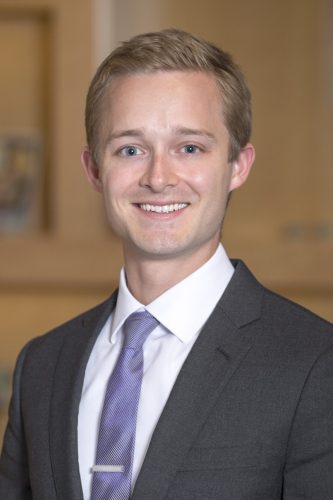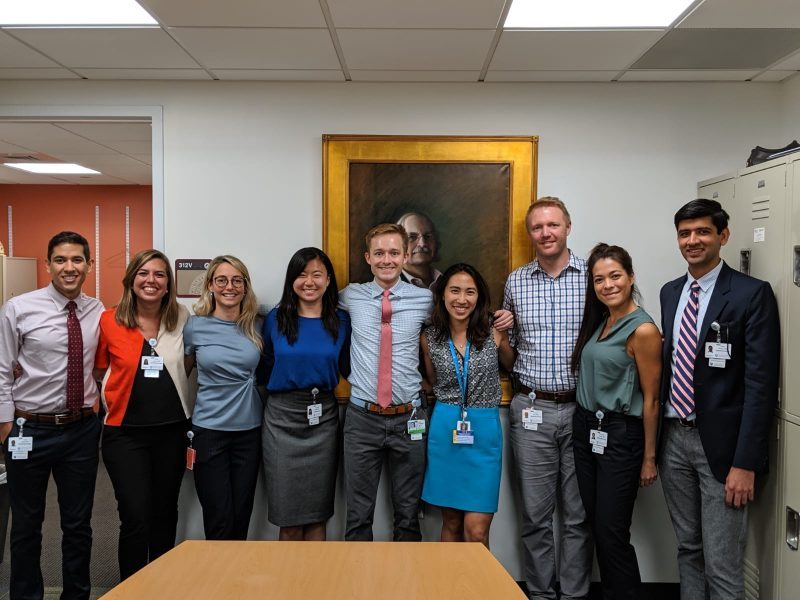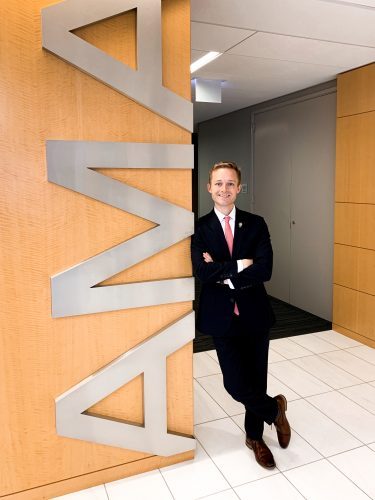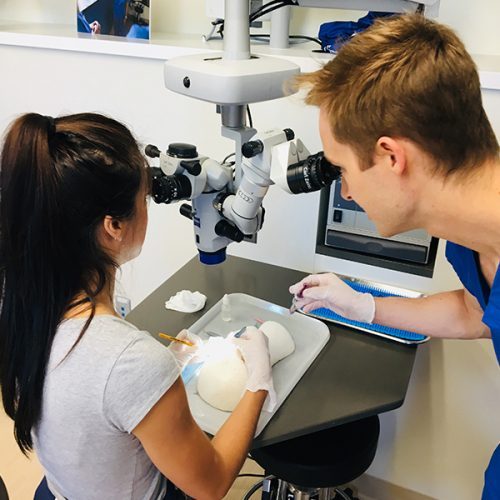Grayson W. Armstrong, MD, MPH, chief resident of the Harvard Ophthalmology Residency Program and director of the Massachusetts Eye and Ear Ocular Trauma Service, gives insight into his typical day and shares how he became interested in ophthalmology and developed a passion for telemedicine.
1. What drew you to the field of ophthalmology?

When I was a kid, I was introduced to ophthalmology early on. My sister had a crossed eye, for which she saw a pediatric ophthalmologist. I have three other siblings – I’m the oldest of four – and we’d all go to the eye doctor together. It felt like a family event where the doctor would turn on cartoons, sing, and let us play with toys. It was great. I thought it was fascinating how he was able to make not only my sister feel comfortable, but also my whole family.
In college, I shadowed an ophthalmologist while he worked in the clinic and performed cataract surgery, and I loved it. I went to medical school knowing that I wanted to be an ophthalmologist. I enjoyed every rotation in medical school, but nothing ever changed my mind.
2. What is a typical day for you as the Ophthalmology Chief Resident?
It’s a combination of clinical work, where I help patients with eye injuries, as well as clinical education and some administrative management.
A large part of my job is responding to incoming trauma cases. As Chief Resident, I’m also the Director of the Mass. Eye and Ear Ocular Trauma Service, and I provide 24/7 coverage for eye trauma throughout the year along with our amazing senior residents. If a patient comes in with a major eye injury, he or she is assessed and the required surgery is performed. I then monitor that patient over time to make sure he or she gets any necessary follow up care. For instance, if a patient needs to see another ophthalmology specialist after surgery, I will be the one to set that up.
Education is also a large piece of my job. Almost every day of the week I help give a lecture to first-year residents. Over the course of the year, I provide residents with an overview of the entire field of ophthalmology. I also help plan other educational events and sessions. For instance, we recently had a three-hour wet lab session where all glaucoma specialists teach residents hands-on surgical techniques, while residents perform glaucoma surgeries on pig eyes under their supervision. Additionally, when I’m seeing patients or performing surgery, I’m always teaching residents.
The final part of my job as Chief Resident is administrative management, which involves helping manage the nitty-gritty of the residency program. For example, I assist with the residents’ schedules and ensure there’s ophthalmology resident coverage for all of the Harvard Ophthalmology-affiliated hospitals.

3. As Chief Resident, do you have time for research? If so, what are you currently working on?
While in medical school, I also got a master’s of Public Health at Harvard, and I’ve continued to have an interest in public health-related research. I’m currently using a national database to study socioeconomic underpinnings associated with major eye injuries that cause a rupture, which are called open globe injuries. No one’s ever looked at this before, but we’ve found evidence that these major eye injuries are skewed heavily toward lower socioeconomic classes.
I’m also focused on programmatic research, specifically for telemedicine for eye care, also called teleophthalmology, and artificial intelligence. Following my year as Chief Resident, I will undertake a one year Clinical Teleophthalmology Fellowship – which will begin in July at Mass. Eye and Ear – where I’ll help set up a telemedicine program for Harvard Medical School Ophthalmology. We’ll be creating the systems for teleophthalmology from the ground up, but I’ll also be studying teleophthalmology implementation and all the benefits, drawbacks, and limitations.
 4. You are also a Trustee for the American Medical Association, the largest physician organization in the country. Could you explain how you got involved with that organization?
4. You are also a Trustee for the American Medical Association, the largest physician organization in the country. Could you explain how you got involved with that organization?
I’ve been involved with the American Medical Association (AMA) since I was a first-year medical student at Brown University’s Warren Alpert Medical School. One of my mentors, Dr. Michael Migliori, chief of Ophthalmology at Brown, was also involved with the organization, and we worked together in the AMA while I was in medical school. I’ve stayed involved ever since in various leadership roles. Last year, I was elected to the Board of Trustees as a representative for resident and fellows, so a large part of my role is to highlight issues that are currently affecting trainees nationwide and make sure their voices are being heard. I also bring the perspective of an ophthalmologist, a clinical educator, and a public health researcher to the job.
5. As a resident, and now in your role as Chief Resident, you have treated hundreds of patients. Are there any cases that you feel have had a lasting impact?
At the end of last year just before I became Chief Resident, I had a case where a child in foster care came in because he had a piece of glass fly into his eye. He was admitted to the hospital for multiple days, and I felt badly for what he was going through. While he had his foster parents to help him, there were multiple foster children that the family had to care for at home, so he was by himself for a majority of the time.
I remember spending hours talking with him so he wasn’t alone. I also brought him a video game to make him feel more comfortable in the hospital setting. I’ve realized that when you have a busy clinical practice, there aren’t many opportunities to sit down and spend time with patients. But I felt it was important in this case to try and make a difference.
6. Your career in ophthalmology is just beginning. What are your plans for the future?
 After completing my Clinical Teleophthalmology Fellowship next year, I plan to stay at an academic medical center, where I’ll see patients and continue to teach medical students and residents. But a goal of mine is to focus on reinventing the way we practice ophthalmology, so that we can bring access to people who don’t otherwise have it. We’re lucky here in Boston that we have a place like Mass. Eye and Ear, where you can get the best eye care in the world with the convenience of multiple locations. I grew up in Charlotte, North Carolina, which is also a big city, but in cities like Boston and Charlotte, issues like health insurance, travel limitations, and a finite number of ophthalmologists result in less access to quality eye care for patients.
After completing my Clinical Teleophthalmology Fellowship next year, I plan to stay at an academic medical center, where I’ll see patients and continue to teach medical students and residents. But a goal of mine is to focus on reinventing the way we practice ophthalmology, so that we can bring access to people who don’t otherwise have it. We’re lucky here in Boston that we have a place like Mass. Eye and Ear, where you can get the best eye care in the world with the convenience of multiple locations. I grew up in Charlotte, North Carolina, which is also a big city, but in cities like Boston and Charlotte, issues like health insurance, travel limitations, and a finite number of ophthalmologists result in less access to quality eye care for patients.
I see telemedicine as a way for people to access the high-quality eye care they need. In the future, we want people to visit their local community clinic, get a digital eye exam, and receive follow up care without having to wait for an eye exam appointment.
7. You obviously stay incredibly busy here at Mass. Eye and Ear. What do you enjoy doing outside the hospital?
I was a music major in college and enjoy playing the guitar. I still sing and play guitar, and hope to go to open mic nights when I can in the future. There’s a gym next door to my apartment that I visit frequently, and lately, my go-to form of exercise is boxing and high-intensity interval training. Lastly, while I don’t have a ton of time for it, I enjoy cooking and baking.
question: i had treatment at MEE last year with photodynamic therapy laser treatment and has improved my vision,
now I have invasive breast cancer
I need to know because they once a week will start me on steriod night before and steriod iv along with taxol and herceptin once a week for 12 weeks then two weeks break then herceptin for 8 months how will this effect my central serous retinaphapy with some what low dose steriods once a week? thank you
MARIE from prov ri
have been to mass eye and ear boston and also one randal square prov ri
thank you
Hi Marie, we unfortunately cannot provide medical advice over the blog, we urge you to contact your Mass Eye and Ear doctor ASAP.